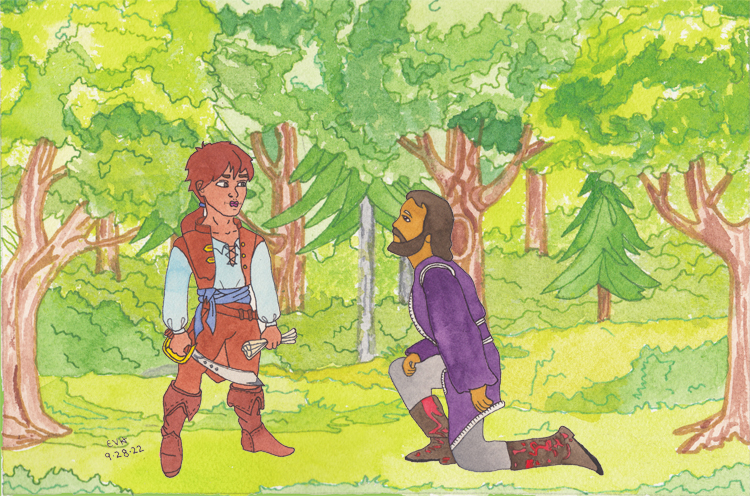
Jataka 371
Dīghitikosala Jātaka
Prince Dīghāvu of Kosala
as told by Eric Van Horn
originally translated by H.T. Francis and R.A. Neil, Cambridge University
originally edited by Professor Edward Byles Cowell, Cambridge University
This is a story about the power of non-violence. It rings true in the later teachings of Jesus, Henry David Thoreau, Mahatma Gandhi, and Martin Luther King, Jr.
“You are within my power.” The Master told this story while he was living at Jetavana. It is about some quarrelsome people from Kosambī. When they came to Jetavana, the Master addressed them at the time of their reconciliation and said, “Brothers, you are my lawful sons in the faith, spawned by the words of my mouth. Children should not trample on the counsel given to them by their father. But you do not follow my admonition. Sages of old—when the men who had slain their parents and seized their kingdom—fell into their hands in the forest. But they did not put them to death even though they were confirmed rebels. But instead they said, ‘We will not trample on the counsel given to us by our parents.’” And then he told them this story from the past. In this birth, both the incident that led up to the story and the story itself will be fully set forth in the Saṅghabhedaka Birth. (There is no such story as the Saṅghabhedaka Jātaka. This may refer to the Kosambiya Jātaka, which is Jātaka 428. This story is also told in the Vinaya Mahāvagga and the Upakkilesa Sutta, which is MN 128.)
Now Prince Dīghāvu, having found the King of Benares lying on his side in the forest, seized him by his top-knot and said, “Now will I cut the marauder who slew my father and mother into 14 pieces.” And at the very moment when he was brandishing his sword, he recalled the advice given to him by his parents, and he thought, “Even though I may sacrifice my own life, I will not trample under foot their counsel. I will content myself with frightening him.” And he uttered the first stanza:
You are within my power, O King,
As you lie prone right here.
What strategy do you now bring
To deliver you from fear?
Then the King uttered the second stanza:
Within your power, my friend, I lie
All helpless on the ground,
I know not any means whereby
Deliverance may be found.
Then the Bodhisatta repeated the remaining verses:
Good deeds and words alone, not wealth, O King,
In hour of death can any comfort bring.
“This man abused me, that struck me a blow,
A third o’ercame and robbed me long ago.”
All those who harbor feelings of this kind,
To mitigate their wrath are ne’er inclined.
“He did abuse and buffet me of yore,
He overcame me and oppressed me sore.”
They who such thoughts refuse to entertain,
Appease their wrath and live at one again.
Not hate, but love alone makes hate to cease.
This is the everlasting law of peace.
(These sentiments are echoed likewise in the Dhammapada, verses 3-5:
He insulted me,
hit me,
beat me,
robbed me’–
for those who don’t brood on this,
hostility is stilled.
Hostilities aren’t stilled
through hostility,
regardless.
Hostilities are stilled
through non-hostility:
this, an unending truth.”
)
After these words the Bodhisatta said, “I will not do you a wrong, Sire. But do not kill me.”
And he placed his sword in the King’s hand. The King, too, said, “And likewise, I will not do you a wrong.”
He swore an oath, and they went to the city. The King presented him to his councilors, and he said, “This, Sirs, is Prince Dīghāvu, the son of the King of Kosala. He has spared my life. I may not do him any harm.”

Figure: “He has spared my life.”
And so saying, he gave him his daughter in marriage. He established him in the kingdom that had belonged to his father. And after that, the two Kings reigned happily and harmoniously together.
The Master here ended his lesson and identified the birth: “The father and mother of those days are now members of the royal household, and I was Prince Dīghāvu.”
